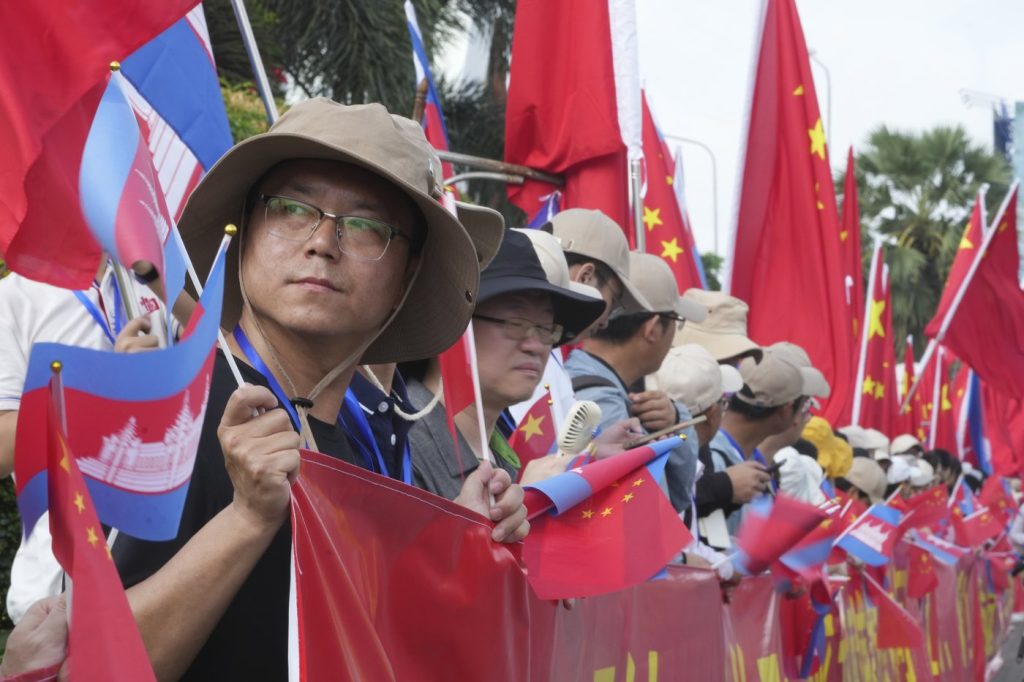Chinese President Xi Jinping arrived in Cambodia on Thursday for a two-day state visit aimed at bolstering the strong ties between China and Cambodia. This visit marks Xi's first trip to Cambodia since 2016 and is part of his three-nation Southeast Asian tour that also includes Vietnam and Malaysia.
Upon his arrival in Phnom Penh, the Cambodian capital, Xi was welcomed by King Norodom Sihamoni. During his stay, he is scheduled to meet with Prime Minister Hun Manet and Senate President Hun Sen, the latter being both Manet's father and his predecessor as prime minister.
Trade is expected to be a key topic of discussion during Xi's visit, especially as Cambodia faces significant tariffs imposed by the United States. With the backdrop of President Donald Trump’s universal 10% tariff as well as a potential 49% tax on exports to the U.S. once a 90-day pause ends, Cambodia's economic concerns amplify the urgency of strengthening ties with China. Several agreements related to cooperation in various sectors are anticipated to be signed during this visit.
Amid global economic challenges and escalating trade tensions with the U.S., Xi reiterated the importance of enhancing bilateral cooperation, particularly in trade and investment. He expressed the necessity of opposing unilateral and protectionist policies, advocating for the maintenance of a multilateral trading system. China is positioning itself as a stabilizing force in Southeast Asia, particularly as the region grapples with the repercussions of U.S. tariffs that threaten export-driven economies.
The timing of Xi's visit coincides with the 50th anniversary of the Khmer Rouge's takeover of Cambodia on April 17, 1975. This historical event led to widespread suffering, with an estimated 1.7 million Cambodians perishing due to starvation, overwork, or executions under the Khmer Rouge regime. Beijing was a substantial foreign supporter of the Khmer Rouge, and although this history is seldom discussed publicly, it remains a significant aspect of the relationship between the two nations.
In recent years, China's influence has been pivotal in driving Cambodia's economic growth. During a recent inauguration of a Chinese-funded infrastructure project, Prime Minister Hun Manet referred to China as "a first-class partner," highlighting major projects such as the newly completed Angkor Siem Reap Airport and a ring road in Phnom Penh named after Xi, a sign of ongoing gratitude and strong bilateral relations. By 2024, China had become Cambodia’s largest trading partner, with trade surpassing $15 billion and accounting for nearly 30% of Cambodia's total trade volume, although the balance remains heavily in favor of China.
China's involvement extends to military matters as well, with investments in the expansion of the Ream Naval Base on Cambodia’s southern coast. This development has raised concerns about the facility's potential use as a strategic outpost for the Chinese navy in the Gulf of Thailand. However, Cambodia has denied any agreements that would grant China special privileges or establish a foreign military base in the country. The Cambodian government has indicated that warships from friendly nations are welcome at the new pier, provided they follow certain conditions. Recently, Japan announced the visit of two minesweepers to the Ream base, marking the first foreign naval visit since the completion of the expansion project.
In summary, Xi's visit underscores the deepening ties between China and Cambodia, reflecting the importance of their partnership in the context of regional and global economic dynamics. The collaborative initiatives in trade, investment, and infrastructure development, as well as military cooperation, illustrate a multifaceted relationship driven by mutual interests amid external pressures and challenges.










